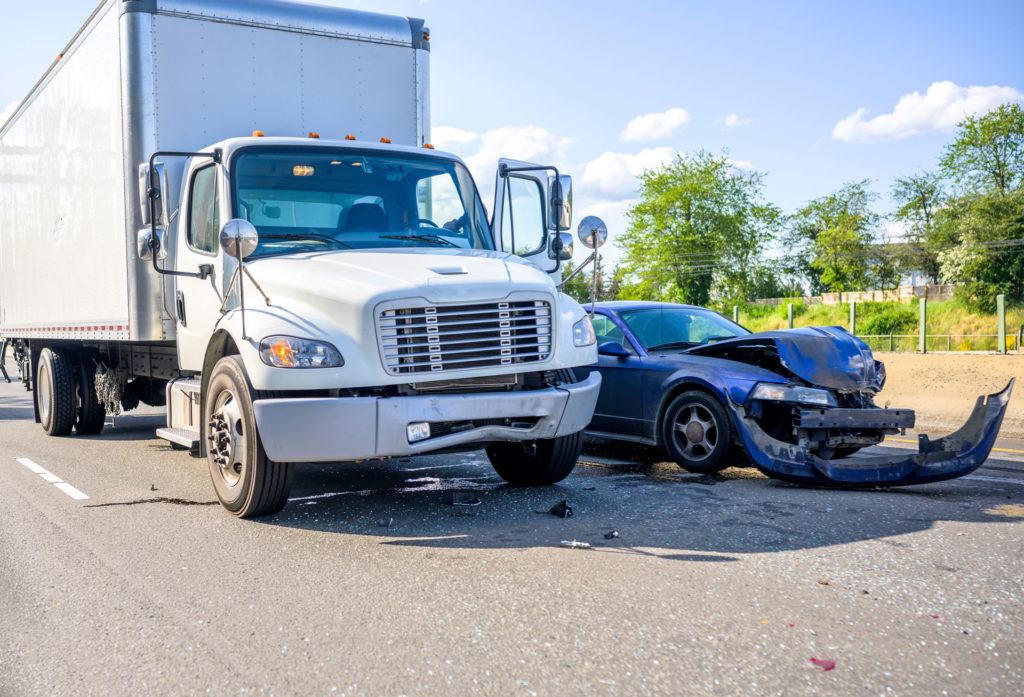Common Causes of Truck Accidents in California
Commercial trucks are complex machines that require diligent maintenance and operation. Truck drivers, trucking companies, and others involved in the truck’s operation can make many mistakes that ultimately lead to a crash on the road. If you have been injured in a wreck, you need an experienced California truck accident attorney who can investigate what happened, determine the cause, and fight for the compensation you deserve.
At Harsh Law, we understand the causes of truck accidents in California, and our team is here to help you demand justice after a crash. Contact us today for a free review of your case.
Speeding or Driving Too Fast for Conditions
Speeding is probably the most common cause of truck accidents. Due to their size and weight, trucks do not slow down or maneuver as quickly as passenger vehicles can. Instead, drivers are expected to plan for maneuvers like slowing down, stopping, and changing lanes. When truck drivers speed, they leave less time to react to situations on the road, like slowed or stopped traffic or a potential collision hazard. A truck accident lawyer in California can help you obtain evidence of speeding if that is what caused your accident.
Wide Turns
Commercial trucks can cause crashes when they need to make wide turns on narrow city streets. An accident may occur when a truck driver swings their vehicle wide left before making a right turn, crashing into a vehicle in the left lane that the trucker didn’t notice. Or a trucker may cause an accident when they make a wide right turn into opposing traffic before straightening out into the correct lane. If the driver fails to notice oncoming traffic before turning, they may cause a head-on collision. Many truck accident claims in California are the result of wide turns gone wrong.
Blind Spots
Commercial trucks have massive blind spots all around the vehicle. There are blind spots 20 feet in front of the truck and 30 feet behind the truck. The blind spot on the left starts behind the cab, extends for most of the length of the trailer, and covers the adjacent lane. The right-side blind spot covers two lanes, from the front of the cab to three-quarters of the length of the trailer. While blind spot mirrors, cameras, and blind spot monitoring sensors help truck drivers stay aware of vehicles around their trucks, a collision can happen if drivers don’t use these aids or check their blind spots.
Unsecured Loads
Truckers are expected to make sure that their cargo loads have been properly secured before setting off on a route. They’re supposed to check that the load is balanced (with weight evenly distributed and heavier items loaded toward the bottom) and is secured so it can’t shift during travel. When a load isn’t properly balanced or secured, a trucker can have trouble controlling the vehicle. Uneven or shifting weight balances can lead to a collision, a rollover accident, a jackknife crash, or an accident involving spilled cargo.
Drowsy or Fatigued Driving
Truck drivers are required to work long hours each day, often spending as many as 14 hours on duty and 11 hours behind the wheel. As a result, truckers may become drowsy or fatigued while driving. The government has hours of service regulations to guard against fatigued driving. Sometimes, though, trucking companies may push their drivers to disregard those regulations so they can make more deliveries and more money.
Drowsy or fatigued driving can be just as dangerous as intoxicated driving. That’s because feeling drowsy or fatigued can have many of the same effects as intoxication, including impaired reaction times, altered perception, and poor judgment and decision-making.
Aggressive Driving
Truck drivers often must meet strict delivery schedules. When truckers fall behind schedule because of mechanical issues, traffic, or weather, they may drive aggressively to try to make up time. Aggressive driving behaviors may include speeding, tailgating, or weaving in and out of traffic. Large commercial trucks aren’t as easy to maneuver as passenger cars and SUVs, however, so aggressive driving by a trucker greatly increases the risk of a collision with other vehicles.
Tailgating
Tailgating, or following too closely, creates a significant risk of a rear-end accident between a truck and the vehicle in front. Trucks require a longer distance to slow down than passenger cars. By tailgating, a driver may not leave enough room to safely slow down if the vehicle in front slows or stops.
In addition, tailgating may put the vehicle in front of the truck inside the truck’s front blind spot. If the car is there, the truck driver won’t be able to see that vehicle slowing down or stopping. The truck driver could also forget about that vehicle and accelerate into the back of it.
Drunk or Intoxicated Driving
Unfortunately, some drivers turn to alcohol, illicit drugs, prescriptions, or over-the-counter medication to help cope with the effects and stress of long days on the road. Intoxicated driving poses a massive risk of an accident. Drivers who lawfully take prescription or over-the-counter medication still have a duty to understand how side effects may affect their driving.
Distracted Driving
Truck drivers have complicated jobs due to the many tasks they need to perform while behind the wheel. They must operate the truck, respond to dispatches on the radio, and navigate the delivery route. But some truck drivers may engage in unnecessary and dangerous distractions, such as:
- Using a cellphone
- Reading
- Eating or drinking
- Grooming
- Reaching around the cab for an object
- Focusing on a radio show, podcast, or audiobook
- Daydreaming
Even a distraction of only a few seconds can lead to a devastating crash.
Unfamiliarity with Local Roads
Truck drivers typically need to get off the interstate or highway to take local roads to their delivery destination. But when truck drivers lack familiarity with the local roads near their destination, they may end up taking their truck onto streets that aren’t safe or suited for 18-wheelers. Or truck drivers may accidentally drive the wrong way down one-way streets or get their vehicle stuck under a low overpass.
Inexperienced Drivers
Safely controlling a large commercial truck requires training and experience. Inexperienced drivers may lack the ability to safely operate their vehicles, particularly on local streets that have less room for large trucks.
Poorly Designed or Maintained Roadways
The design or condition of roadways can also lead to truck accidents. For example, poor road design can confuse motorists, including truck drivers, or unsafely obstruct a motorist’s view. Poor or no road maintenance can result in hazardous road surfaces, like broken pavement, potholes, or debris. These road issues can damage truck tires, axles, or drivetrains and lead to a crash.
How Our Attorneys Investigate Causes of Truck Crashes
At Harsh Law, our truck accident lawyers know that truck crashes have many potential causes and that parties other than the truck driver may be responsible. As a result, we thoroughly investigate every truck accident case we take on, reviewing all available evidence to determine who and what caused the truck crash. Some examples of the types of evidence we may use include:
- The truck driver’s hours of service logs may help prove that the truck driver had been behind the wheel too long and may have been drowsy or fatigued at the time of the accident
- The truck driver’s alcohol/drug screen if a test is performed after the crash
- The truck driver’s employment records and driving history
- Logs from the truck’s electronic data recorder, or “black box,” will reveal details about the truck’s operation in the moments leading up to the accident, such as its speed or the driver’s braking or acceleration
- The truck’s inspection and maintenance records may show whether inadequate maintenance led to a mechanical failure that caused the accident
- Post-accident inspection reports, which might reveal the existence of a defective truck part
- Surveillance camera, traffic camera, or dashcam footage
- The trucking or freight company’s dispatch logs
- The cargo or load manifest may show whether the truck was overloaded or whether the cargo was improperly loaded or secured
- Police accident reports
- Accident scene photos and video
- Eyewitness statements
We leave no stone unturned in our investigations of commercial truck crashes. Our goal at Harsh Law is to determine the cause of the crash and identify every possible source of compensation available to you.
Harsh Law is a personal injury law firm that proudly serves communities throughout Southern California. Give our expert legal team a call at 909-793-6261 for a free case evaluation.



